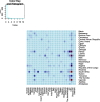Human microbiota research in Africa: a systematic review reveals gaps and priorities for future research
- PMID: 34911583
- PMCID: PMC8672519
- DOI: 10.1186/s40168-021-01195-7
Human microbiota research in Africa: a systematic review reveals gaps and priorities for future research
Erratum in
-
Correction to: Human microbiota research in Africa: a systematic review reveals gaps and priorities for future research.Microbiome. 2022 Jan 19;10(1):10. doi: 10.1186/s40168-022-01226-x. Microbiome. 2022. PMID: 35045873 Free PMC article. No abstract available.
Abstract
Background: The role of the human microbiome in health and disease is an emerging and important area of research; however, there is a concern that African populations are under-represented in human microbiome studies. We, therefore, conducted a systematic survey of African human microbiome studies to provide an overview and identify research gaps. Our secondary objectives were: (i) to determine the number of peer-reviewed publications; (ii) to identify the extent to which the researches focused on diseases identified by the World Health Organization [WHO] State of Health in the African Region Report as being the leading causes of morbidity and mortality in 2018; (iii) to describe the extent and pattern of collaborations between researchers in Africa and the rest of the world; and (iv) to identify leadership and funders of the studies.
Methodology: We systematically searched Medline via PubMed, Scopus, CINAHL, Academic Search Premier, Africa-Wide Information through EBSCOhost, and Web of Science from inception through to 1st April 2020. We included studies that characterized samples from African populations using next-generation sequencing approaches. Two reviewers independently conducted the literature search, title and abstract, and full-text screening, as well as data extraction.
Results: We included 168 studies out of 5515 records retrieved. Most studies were published in PLoS One (13%; 22/168), and samples were collected from 33 of the 54 African countries. The country where most studies were conducted was South Africa (27/168), followed by Kenya (23/168) and Uganda (18/168). 26.8% (45/168) focused on diseases of significant public health concern in Africa. Collaboration between scientists from the United States of America and Africa was most common (96/168). The first and/or last authors of 79.8% of studies were not affiliated with institutions in Africa. Major funders were the United States of America National Institutes of Health (45.2%; 76/168), Bill and Melinda Gates Foundation (17.8%; 30/168), and the European Union (11.9%; 20/168).
Conclusions: There are significant gaps in microbiome research in Africa, especially those focusing on diseases of public health importance. There is a need for local leadership, capacity building, intra-continental collaboration, and national government investment in microbiome research within Africa. Video Abstract.
Keywords: 16S rRNA sequencing; Metagenomics; Microbiome; Next-generation sequencing; Public health; Systematic review.
© 2021. The Author(s).
Conflict of interest statement
The authors declare that they have no competing interests.
Figures









References
-
- Cani PD, Van Hul M. Gut microbiota and obesity: causally linked? Expert Rev Gastroenterol Hepatol. 2020;14:401–403. - PubMed
Publication types
MeSH terms
Grants and funding
LinkOut - more resources
Full Text Sources
Miscellaneous

